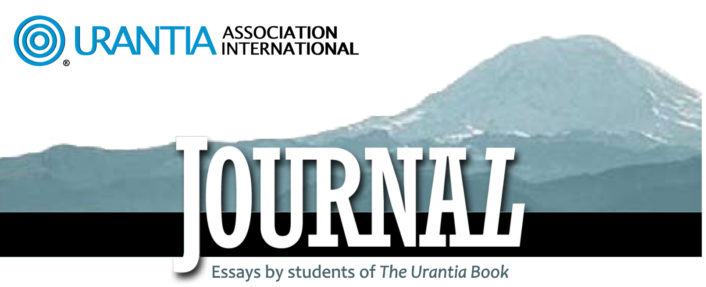© 2021 Christopher Ross, Kathleen Swadling, Chris Wood, Bruce Jackson
© 2021 International Urantia Association (IUA)

¶ In This Issue
- Journal Editorial – May 2021
- No Appointments, No Disappointments – Christopher Ross, USA
- Making Worship and Service the Center of Our Lives – Kathleen Swadling, Australia
- Preparing for Spontaneity – Chris Wood, USA
- Millennials and the Church – Dr Bruce Jackson, USA
- About the Journal
- Ways to Donate to Urantia Association International
¶ Journal Editorial – May 2021
Welcome to the May 2021 edition of the Urantia Association’s Journal, a publication dedicated to the thoughts, observations, and experiences of Urantia Book students from around the world. This edition offers a broad scope of ideas and reflections, including spiritual insights gained from personal tribulations, approaches to worship and service, tactful ideas for spreading the good news, and novel ways to introduce the ideals and ideas of The Urantia Book to younger generations.
Our first article, No Appointments, No Disappointments: Adversity and the Authentic Self, is a moving and thoughtful piece by Christopher Ross, who describes his tragic experience with a partner who was a spiritual seeker like himself but who could not find happiness in his own life. This sad event inspired him to closely examine his “authentic self” as well as “the mission of adversity and the spiritual value of disappointment” that God and his angels present to all of us in the course of our lives. How we deal with such problems, he concludes, is not by intellect alone but by a daily devotion of oneself to conscious union with God.
The second article, Making Worship and Service the Center of Our Lives by Kathleen Swadling, takes a close look at how we internalize concepts of worship and service, as well as how we can incorporate a meaningful, daily practice of worship and service in our lives. She reminds us of the central role worship plays in any spiritual progress, “worship is really the fountain head, the fundamental premise from which everything else of spiritual value springs.” In particular, Kathleen stresses the point that our relationship with our Father is like any relationship of love; you have to work at it. And this work includes not only worship but also an attitude of sincerity, making the right choices, sharing our lives with God and, just as importantly, offering our loving services to others.
Our third paper, Preparing for Spontaneity by Chris Wood, addresses the methods by which we attempt to share the teachings of The Urantia Book with others, especially those unfamiliar with it. The subtitle of his article, The Necessary Work to Avoid Sounding Crazy, sums it up nicely. I’m sure that many of us, if not all of us, who are greatly enthused by this revelation have encountered awkward situations whenever we attempt to share brilliant quotes from the book. Indeed, we can sound crazy. But Chris has some good advice on how to present the teachings in a way that is both tactful and effective.
And finally, our fourth article, Millennials and the Church: An Important Lesson for the Urantia Movement by Bruce Jackson, addresses an issue that many of us Urantia Book old-timers have long pondered—where are all the young folk? But this is the same question that most religious institutions are asking today, and I would go so far as to say that it is not just religions suffering this fate of indifference but almost any organization, including service clubs such as Kiwanis International, or even local photography clubs. Bruce takes a look at the considerable research Christian organizations and research centers have conducted in an attempt to understand why millennials are so complacent about joining religious groups and he then applies the same reasoning to people in the Urantia movement. These are thoughts to ponder if we seriously wish to engage our youth in the fifth epochal revelation.
¶ No Appointments, No Disappointments
Christopher Ross, USA
¶ Adversity and the Authentic Self

(Adapted and updated from a presentation given at The Mission of Adversity and the Spiritual Value of Disappointment Virginia-Carolina Association Annual Mini-Conference, 2018.)
“That Saturday night the Master talked for more than an hour to the assembled groups on ‘The mission of adversity and the spiritual value of disappointment.’ This was a memorable occasion, and his hearers never forgot the lesson he imparted.” [UB 51:0.1 emphasis added]
In 1985, when I moved in with my first male partner, we had known each other for only two weeks. And in those two weeks, we had probably been together no more than two or three times. But Owen gave me a key to his apartment almost immediately; thus, when my marriage fell apart rather abruptly and my now ex-wife asked me to leave, I knew exactly where I would go.
Over the next weeks and months, as Owen and I got to know each other, I learned that his taste in books included A Course in Miracles, along with Marion Zimmer Bradley’s The Mists of Avalon, a retelling of the legend of King Arthur from the female point of view, Shakti Gawain’s Creative Visualization, and The Seth Material. Seth claimed to be a spiritual teacher who spoke through author Jane Roberts while she was in trance.
Owen read and reread these books over and over, underlining with a dull red pencil. It occurs to me now that I never saw him meditate or pray, just read and reread these books with his little red pencil.
¶ Making Worship and Service the Center of Our Lives
Kathleen Swadling, Australia

(Adapted from a presentation given at the Australia and New Zealand Association Annual Conference in Tasmania, 2010)
We spend a lot of time getting a good grip on the definition of worship and service. And if I’m to write about “making worship and service the center of our lives” then I’d better concentrate on exploring the hows and wherefores of practicalizing and internalizing the profound truths we discover on these topics through our study of the book.
The key to serving others—to being a dynamically useful individual in the world—is our personal relationship with the Father. I wonder how many of us, on a consistent basis, actually make a point of devoting regular times slots for going off on our own to a quiet place where we won’t be disturbed, to communicate with the Father—to pray and worship. I’d like to raise my hand and say “I do” but if I’m to be truly honest with you I must say that, while I would ideally like to be more regular and consistent, it’s sometimes a bit like trying to allow regular times to exercise—sometimes I get all fired up and establish a regular routine, while other times I let it slip and get out of the habit.
¶ Preparing for Spontaneity
Chris Wood, USA
¶ The Necessary Work to Avoid Sounding Crazy

(Adapted from a presentation given at the first 24-hour online event in March 2020.)
We have a problem in the Urantia community. We are in danger of becoming an isolated tribe on an isolated world. If we do not constantly adapt the language we use to the cultures around us, then we will further isolate ourselves and fail to bring the true teachings of Jesus to the world.
I am a philosopher by training. My favorite course to teach was Introduction to Philosophy. Introductory courses translate a subject’s ideas into common language, while in-depth courses teach you a new language to better develop these ideas. I liked the idea of taking what might literally be a lifetime of work and dedication and cutting it down to one hour’s worth of reading and one hour’s worth of lecture. You have to provide enough of a hook to each subject that it might grab the attention of a student, enough depth that it will show the worthiness of dedicating a career to its study, enough hints at future studies to give those students paths forward, but also enough of a structure and closure that the 99% of students who listen and are not fascinated can still recall later in life, “Oh, yeah, utilitarianism. It’s great for group decision making but I think it’s flawed as an individual moral system.”
¶ Millennials and the Church
Dr Bruce Jackson, USA
¶ An Important Lesson for the Urantia Movement

The internet is full of articles, research, and advice concerning the serious loss of the millennial generation to the Christian church rosters around the world and in North America and Europe in particular. The exodus of young adults from churches is nothing new, but it has become increasingly acute in the past decade and is a major concern of many churches and denominations. The Urantia movement is confronting much the same situation in our study groups and institutions.
First, I must make the following disclaimer. I have shared information with Jesusonians concerning what is happening within Christendom in recent years. I have often been met with the response that what happens in Christian churches is not relevant to our Urantia movement. I have found that for some readers, there is little understanding of what is going on in modern Christian churches due to an over reliance on the analysis of Christianity found in Paper 195 (and in other sections).
With the knowledge that the writing of The Urantia Book was completed in 1934, and when we apply an understanding of the history of Christianity during the early 20th Century, it becomes clear that T_he Urantia Book’_s perspective was skewed by the events in Christendom at that time. Throughout the early 20th century, the Christian church was struggling with the emergence of extreme strains of fundamentalism resulting from such theories as atonement doctrine, prosperity theology, and claims of biblical inerrancy. The modern Christian church has undergone significant changes in the intervening 80+ years as they advance enlightened theologies and vigorous social consciousness movements that are not reflected in the text of The Urantia Book.
¶ About the Journal

The Journal is produced twice yearly and contains essays, articles and study aids by readers and for readers of The Urantia Book. Any interpretations, opinions, conclusions, or artistic representations, whether stated or implied, are those of the authors and do not necessarily represent the views and opinions of Urantia Association International, the National or Local Urantia Associations, or the editorial team of the Association’s Journal.
You can view the entire collection of issues in the archives. All issues before 2017 are downloadable PDF format.
The Journal is currently published in English, French and Spanish. (There are some older issues that were published in Finnish.) You can view the French and Spanish Journals by clicking on the language choices in the pull down menu at the top of the page.
- Subscriptions
- Journal Team
- Submission Policy
- Citation Guidelines
¶ Ways to Donate to Urantia Association International

The world is changing fast and Urantia Association International is in a unique position to foster the Urantia revelation in so many ways. With localized teams in the form of associations springing up across the globe, we are ready to help anyone, anywhere, to study and spread the teachings that we all hold so dear.
The Association has only one paid staff member to manage and coordinate our worldwide activities. All other services are rendered by devoted students who donate their time (and often their treasure) to the projects that help bring us closer to our heavenly Father. Thank you to our faithful volunteers and donors!
Here is a selection of ways to donate to Urantia Association: